Mar. 31, 2020
Summary
- To ascertain the effects that the spread of Covid-19 is having on consumers’ daily lives, Nomura Research Institute (NRI) conducted an urgent internet survey of approximately 3,000 Japanese respondents in March 2020.
- Nearly 80% of respondents said they believed economic conditions or stock prices this year would deteriorate/decline, while close to 50% expected their household income to fall. These figures were significantly higher than in the survey done at the end of last year.
- Since the spread of Covid-19, respondents have been shopping in-store for daily necessities less frequently, yet they are stocking up whenever they do shop and making internet purchases more than before. This suggests that, at least in terms of daily necessities, short-term expenditures are likely on the rise.
- The government should periodically tabulate and publish cashless payment information in certain categories, e.g. by business type, by prefecture, etc. By using cashless payment information, it would be able to ascertain—almost in real time—which specific sectors and regions are seeing a downturn in consumer spending, and to what extent this is happening. Together with other data such as behavioral changes gleaned from questionnaire surveys, this would therefore serve as a useful information source for policymakers and corporate managers.
80% of People Expect Economic Conditions to Worsen Going Forward
In order to ascertain the effects that the spread of Covid-19 is
having on consumer activity and psychology, Nomura Research Institute
(NRI) conducted an urgent internet survey of approximately 3,000
Japanese persons in March 2020. Compared with the internet survey that
NRI conducted in January on people’s daily activities, this urgent
survey revealed a definite rise in people’s uneasiness regarding their
own health and that of their spouses, children, parents, and other
family members, as well as a growing anxiety among the population
toward contagious diseases. A higher percentage of persons also said
they were anxious about declining incomes and asset values, rising
taxes and social insurance costs, and a breakdown of the social
security system, expressing greater unease about an uncertain road
ahead (Fig. 1).
In addition, whereas 47% of respondents said at the end of 2019 that
they believed economic conditions would “worsen” going forward, this
number grew substantially to 82% in the current survey (March 2020).
And although 36% of respondents thought at the end of 2019 that stock
prices would fall, that number grew to 77% in March 2020. While the
percentage of those expecting their household incomes to fall exceeded
50%, this could suggest that the decline may not be as severe as the
deterioration of the economy and stock prices (Fig. 2).
People Going Out Shopping Less, Bulk Buying and Internet Shopping on the Rise
Following the spread of Covid-19, the call for people to abstain from
travel and other non-essential/non-urgent outings caused a slump in
related consumer activity. Yet it seems that spending on food,
everyday sundries, and other daily essentials has increased in the
wake of the spread of Covid-19 (Fig. 3).
The percentage of respondents who said they were buying daily
essentials in stores “less than before” (22%) was significantly higher
than those who said “more than before” (5%), revealing that people are
going out less often and are tending to buy more in bulk per shopping
trip. Further, more respondents said they were purchasing everyday
essentials online “more than before” (10%) as opposed to “less than
before” (5%), revealing that people are refraining from going out and
instead taking advantage of online shopping opportunities more, if
only slightly (Fig. 4). Looking at the answers to another survey
question, we see also that at the time this survey was conducted
(around March 20, 2020), the percentage of respondents who said they
“are going out less” stood at 48.1% overall, or nearly half of all
respondents (Fig. 5).
Two Trends in Lifestyle Preservation: Stocking Up on Daily Essentials and Curbing Overall Spending
When it comes to things on which people actively wanted to spend their
money in the next month, and those on which they wanted to curb
spending, to a certain degree the results obtained were as expected.
Looking strictly at those whose spending on daily essentials had gone
up, we see that respondents cited “food” (73%), “drinks” (45%), and
“prescription drugs and medicines” (24%) as the top items on which
they eagerly wanted to spend money going forward, reflecting a desire
to safeguard their lifestyles by stocking up on everyday essentials
and drugs. Conversely, if we look only at those who were spending less
on these daily necessities, we see that “dining out” (37%),
“clothes/fashion for when going out” (32%), “travel expenses” (28%),
and “social/entertainment expenses” (26%) were the responses given
most often when it came to areas where people wanted to spend less
going forward. This revealed another tendency to protect one’s way of
living by cutting expenses not only on daily necessities but on
non-essentials as well (Fig. 6).
As for how often people are eating out, 35% of respondents said that
since the spread of Covid-19 they have been dining out “less than
before”, meaning that demand for restaurant dining has fallen, as
expected. However, the use of meal delivery services did not see a
conspicuous increase, at least as of the time of this survey. It can
be inferred that at present, the reduced frequency of dining out is
not so deeply tied to the use of such delivery services, and that more
people are cooking at home in conjunction with their bulk buying of
food (Fig. 7).
Consumers Turning Their Attention to Companies’ Stances in Wake of Spread of Covid-19
When asked about how their attitudes have changed in the wake of the
spread of Covid-19, 84% of persons affirmed (total percentage of
“agree” or “somewhat agree” responses) that they are “turned off by
internet sites that are selling masks, toilet paper etc. at higher
prices than usual or ignoring abuse by resellers” (Fig. 8). In
addition, some 59% of respondents agreed that “support will increase
for companies or brands that are consumer-friendly and helpful, e.g.
those selling low-priced bento boxes for children during school
closure.” These results show consumers are more interested in and
paying more attention to the stances that companies are taking in the
wake of the spread of Covid-19.
Furthermore, nearly half of respondents (49%) agreed that “there’s a
growing sense that work can be done to some extent without going to
the office, and workstyles in Japan will change significantly going
forward.” We can see that some people feel new workstyles including
teleworking will become more prevalent from here onward.
Utilize Cashless Payment Information to Accurately and Immediately Grasp Consumer Trends
Our questionnaire survey offers a glimpse at fluctuations in consumer
spending by sector, behavioral changes in shopping and shifts in
consumer psychology as measured before and after the spread of
Covid-19. That said, it does not allow us to grasp which specific
sectors and regions are actually seeing lower (or higher) consumer
spending, and to what extent this is happening. Given that the
government’s surveys of household finances are published about two
months after the fact, they too lack an immediacy.
In this survey, we also asked respondents whether they had seen or
heard any (seemingly) fake news regarding the spread of Covid-19, and
in fact over half of them answered that they had found what appeared
to be fake news. In addition to word that toilet paper would be sold
out, that heat would kill the virus, and other such information,
speculative and exaggerated accounts have also appeared online
regarding economic conditions. Fragmentary bits of information about
sales in specific industries (e.g. department stores), for instance,
are the only data publicly available that can be considered
reliable.
What we need is more comprehensive and immediate information on
consumer activity. The aspect we need to focus on in particular is
cashless payment information. As of February 2020, Japan had
approximately one million registered member stores offering cashless
payments or reward points, with these stores being compensated for the
reward points redeemed based on information about the value of
cashless payments made there. By employing this framework, we can
immediately obtain a general view of consumer spending information in
Japan. Furthermore, the more that Japanese people make use of cashless
methods, the more accurate our overall picture of consumer activity
will be. What the government needs to do is further promote cashless
payments, and collect and periodically publish such information by
business type and prefecture etc., not only in order to provide
accurate information to people, but also to utilize it as a vital
information source that will enable policymakers and corporate
managers to make decisions swiftly.
[Reference] Survey Overview
|
■Survey name |
Investigations on the Effects of the Spread of Covid-19 Infection on Lifestyle |
|
■Survey period |
March 2020 |
|
■Survey method |
Internet survey |
|
■Survey subjects |
Men and women aged 15-69 across the country |
|
■Number of valid responses |
3,098 people |
|
■Main survey items |
|
|
◇Information gathering behavior |
…Ways of gathering information, and any changes thereto |
|
◇Communication |
…Attitudes towards parent-child relationships, marital relationships, local relationships |
|
◇Workstyle |
…Work conditions, work attitude |
|
◇Consumer values |
…Attitudes toward consumption, areas where subjects are eager to spend their money going forward |
|
◇Actual consumer activity |
…Inclination to dine out, use meal delivery or online services etc., and any changes thereto |
|
◇Overall lifestyle, life planning |
…Economic/income prospects, any uneasiness or worries currently faced |
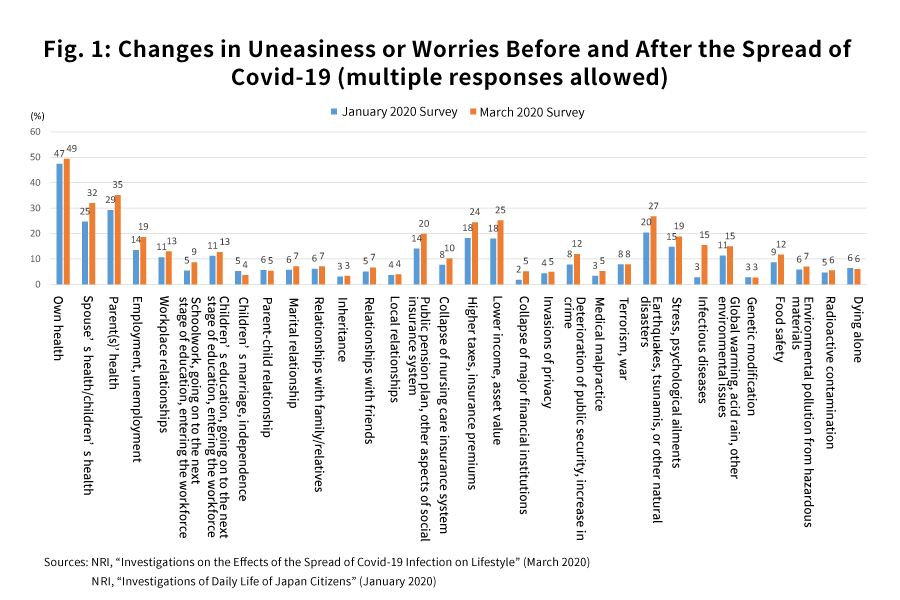
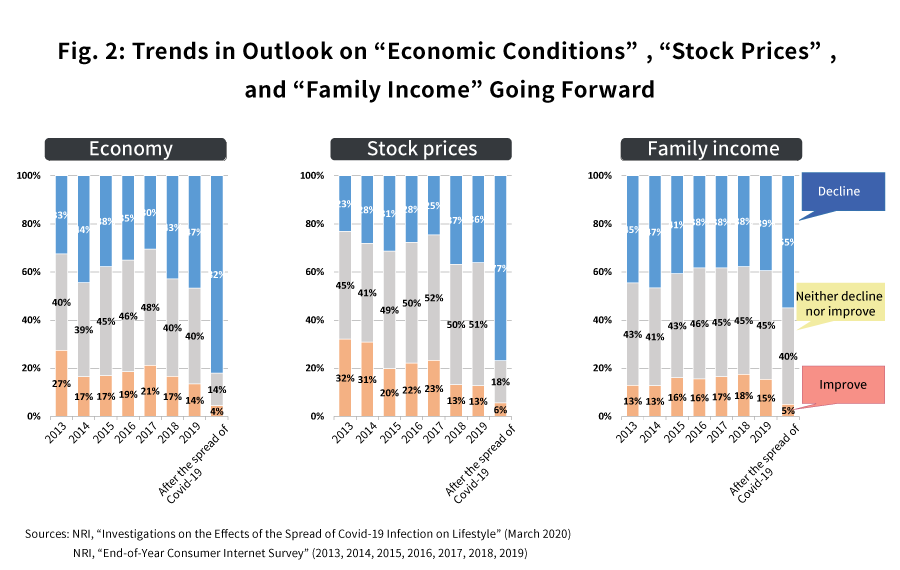
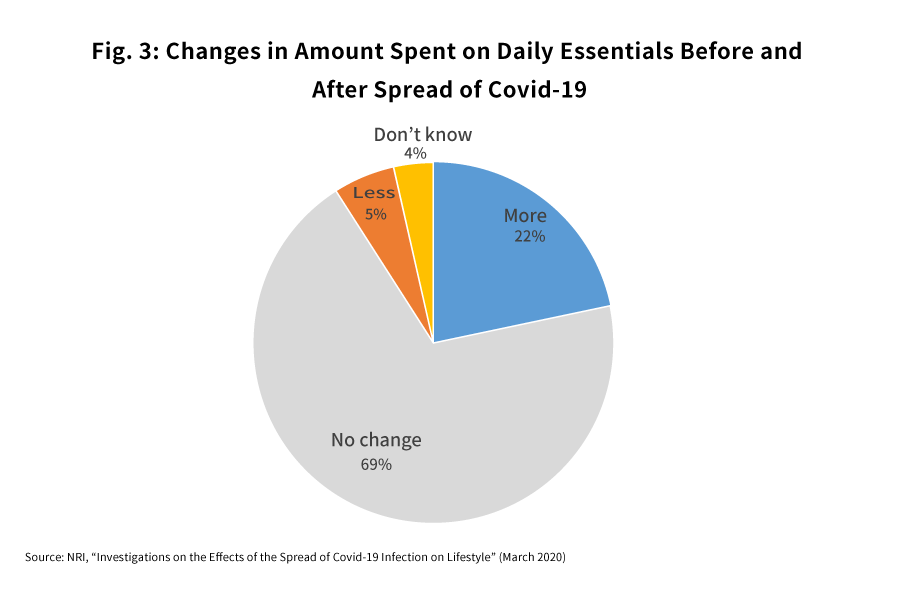
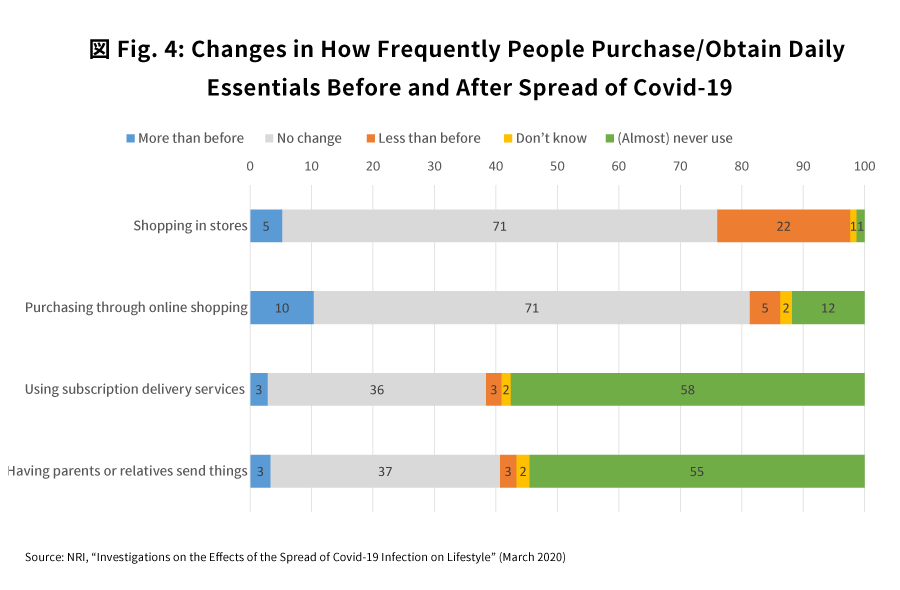
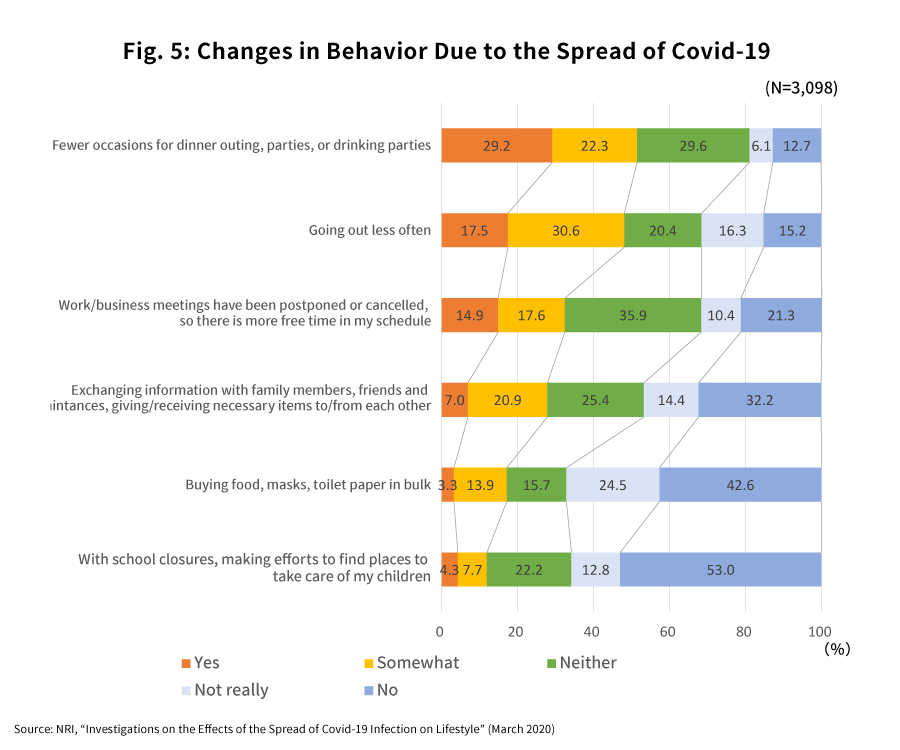
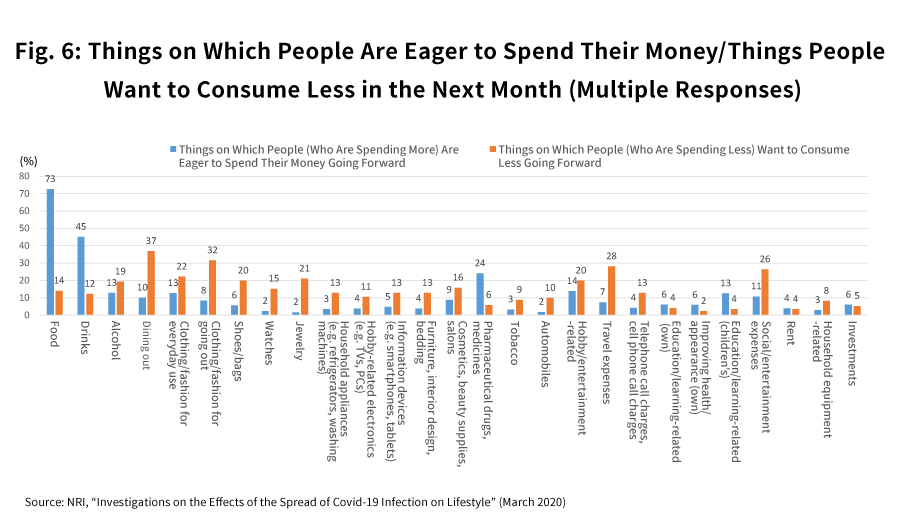
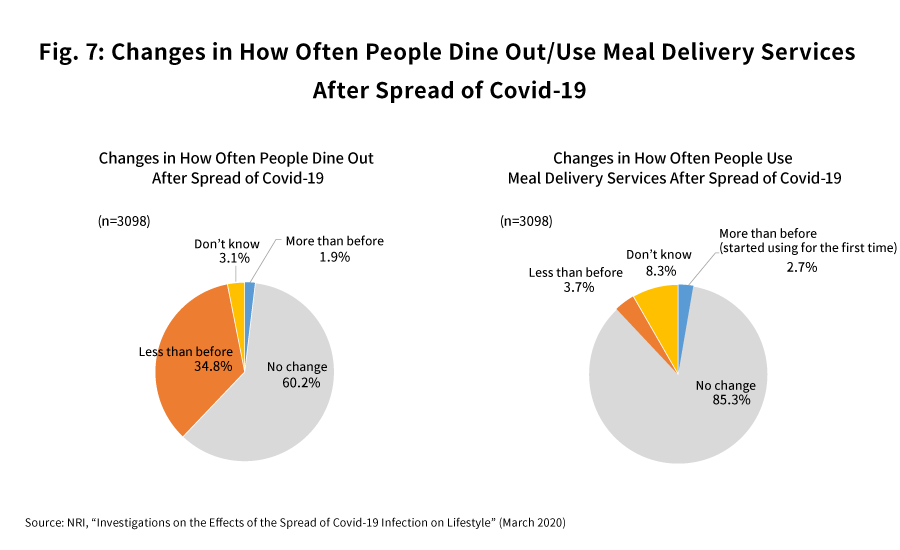
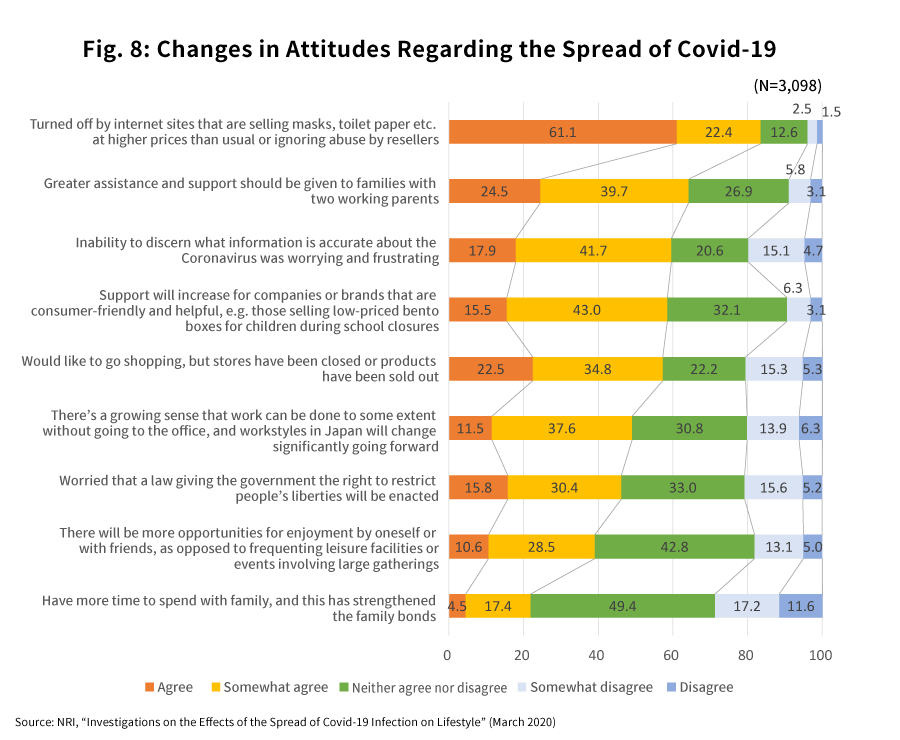
Authors
Takeshi Mori
Center for Strategic Management & Innovation
Nomura Research Institute
Hiroyuki Hayashi
Marketing Science Consulting Department
Nomura Research Institute
Hiroyuki Nitto
Consulting Division
Nomura Research Institute
Contact Us
Media Inquiries:
-
Corporate Communication Department
Nomura Research Institute, Ltd.
TEL: +81-3-5877-7100
Inquiries about the proposals:
-
Center for Strategic Management & Innovation
Nomura Research Institute, Ltd.